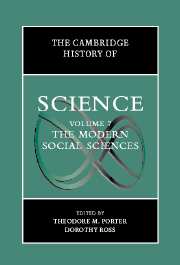Book contents
- Frontmatter
- 1 Introduction: Writing the History of Social Science
- PART I SCIENCES OF THE SOCIAL TO THE LATE NINETEENTH CENTURY
- PART II THE DISCIPLINES IN WESTERN EUROPE AND NORTH AMERICA SINCE ABOUT 1880
- PART III THE INTERNATIONALIZATION OF THE SOCIAL SCIENCES
- 22 The Sciences of Modernity in a Disparate World
- 23 The Social Sciences in Latin America during the Twentieth Century
- 24 Psychology in Russia and Central and Eastern Europe
- 25 Sociology in Egypt and Morocco
- 26 The Social Sciences in Africa
- 27 The Social Sciences in India
- 28 The Social Sciences In China
- 29 The Social Sciences in Japan
- PART IV SOCIAL SCIENCE AS DISCOURSE AND PRACTICE IN PUBLIC AND PRIVATE LIFE
- Index
- References
22 - The Sciences of Modernity in a Disparate World
from PART III - THE INTERNATIONALIZATION OF THE SOCIAL SCIENCES
Published online by Cambridge University Press: 28 March 2008
- Frontmatter
- 1 Introduction: Writing the History of Social Science
- PART I SCIENCES OF THE SOCIAL TO THE LATE NINETEENTH CENTURY
- PART II THE DISCIPLINES IN WESTERN EUROPE AND NORTH AMERICA SINCE ABOUT 1880
- PART III THE INTERNATIONALIZATION OF THE SOCIAL SCIENCES
- 22 The Sciences of Modernity in a Disparate World
- 23 The Social Sciences in Latin America during the Twentieth Century
- 24 Psychology in Russia and Central and Eastern Europe
- 25 Sociology in Egypt and Morocco
- 26 The Social Sciences in Africa
- 27 The Social Sciences in India
- 28 The Social Sciences In China
- 29 The Social Sciences in Japan
- PART IV SOCIAL SCIENCE AS DISCOURSE AND PRACTICE IN PUBLIC AND PRIVATE LIFE
- Index
- References
Summary
History, Marc Bloch said, is the “science of men in time … [which is] a concrete and living reality with an irreversible onward rush … the very plasma in which events are immersed, and the field in which they become intelligible.” Social science, by analogy, is the science of modernity, “an enterprise of the modern world. Its roots lie in the attempt, full-blown since the sixteenth century, and part and parcel of the construction of our modern world, to develop systematic, secular knowledge about reality that is somehow validated empirically.” Modernity, in short, stands in the same “plasmic” relation to social science that time does to history.
Perhaps until the end of the 1960s, common sense might have maintained that modern equaled Western, that Westernization equaled modernization. In the wake of worldwide events since 1989, it has again pleased some segments of public opinion to reassert this commonsense view, particularly in the name of neoliberal economic reform. The chapters that follow, notwithstanding their differences in approach, focus, and argument, suggest that the equation of modern with Western is (whether for or against) more an ideological than a historical position. For no single, universal modernity lies waiting at the end of all particular histories. Though powerful (and destructive, according to Serge Latouche), the Western-oriented “drive toward global uniformity” cannot succeed. The paths to modernity are many, and those paths lead to different modernities.
- Type
- Chapter
- Information
- The Cambridge History of Science , pp. 405 - 412Publisher: Cambridge University PressPrint publication year: 2003

